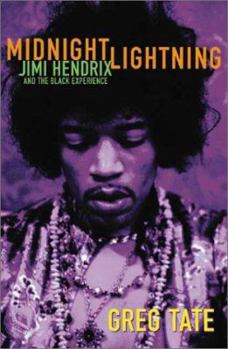Midnight Lightning: Jimi Hendrix and the Black Experience
Jimi Hendrix's social meaning, his sexual mystery, and his scientific explorations in the field of sound are addressed here from a black perspective. This unique introduction to a man who, despite his... This description may be from another edition of this product.
Format:Hardcover
Language:English
ISBN:1556524692
ISBN13:9781556524691
Release Date:July 2003
Publisher:Lawrence Hill Books
Length:152 Pages
Weight:0.85 lbs.
Dimensions:0.6" x 6.4" x 8.7"
Customer Reviews
2 ratings
As society has always seen it........
Published by Thriftbooks.com User , 19 years ago
Jimi was African American Period. The white american society today as well as then always viewed anyone mixed black as being black. There were scores of african american people who were mixed with other races that america still see's them as just being black....that is how it has always been. THIS BOOK SPEAKS THE TRUTH, PLAIN AND SIMPLE. America, particularly back then didn't have a problem with Hendrix because his musical genius overshadowed his race. Had Hendrix played strictly soul music then. His treatment and his fame would have been virtually unheard of and he would have not been such an icon that he is now. on a persone note: I remember growing up in the 1970's in new york and watching white teen age kids use the -N- word while walking around wearing a Jimi Hendrix t-shirt. This the type of experience the author is trying to express and/or convey to the audience. The Black Experience and everything it embodied throughout the turbulent 1960's when Hendrix came on the scene.
Tell It Like It Is, Or Was!
Published by Thriftbooks.com User , 21 years ago
Jimi Hendrix is an African American musician who excelled at his craft; he was discovered by several would be managers and producers who obviosly didn't know what to make of him. The last to 'discover' him was graced by luck on having Hendrix relocate to another muisic, and cultural, climate. This gave Hendrix the 'void' he needed to be heard. In the US, New York, in particular, Hendrix confronted the gatekeepers of 'Black Music'(blues, jazz, R & B) tradition (the way it is, the way it works)and philosophy (how a certain music should be played)- nothing bad in and of itself it gave us Howlin' Wolf, Coltrane, James Brown, and others. Unless he was playing in the tradition and philosophy of guitarist Charlie Christian or Wes Montgomery, Hendrix was told there was no room for him to be heard. He was to far removed (advanced, different, or what have you) for them to understand. The relocation to England where there was no blues, jazz, or R & B gate-keepers to be confronted with proved successful for his being heard. However this incident, a stroke of fate, has caused more misunderstanding and mis-interpretation (some deliberate) of Hendrix than one could imagine. It is this misunderstanding and mis-information that Greg Tate tackles head-on - The Race Issue and Jimi Hendrix. This is the first serious indept effort at this explosive subject. Tate makes it very clear that a plane ride to Europe did not transform Hendrix from that of an African American (a Black man), with American-made racial baggage, to something other. Interestingly, if not unwittingly, he demonstrates how it is that White people changed if only to let Hendrix in. These, would-be white fans, associates and lovers, are the sames Whites (speaking in general terms) from whom Black people were demanding civil rights, human rights, an end to colonization, oppression, racism, etc. (Remember the 1960's?). Tate shows that whites were/are willing to let Hendrix in because he 'appeared different' - different than their stereotypes and myths that defined Black people as dangerous and other-worldly (I'm being nice here.) - and, for what they could extract from him for themselves. Tate exposes racism at work in the shaping of the Jimi Hendrix myth. How white people defined him for themselves ("He's abscent of race and politics"), and projected that image to themselves and to others - including Black people. Yet we get to see Hendrix for who he was, an artist, more concerned with his art than politics, though he did mature politically - 'Machine Gun', 'Earth Blues', 'Power Of Soul', 'Star Spangled Banner' ('nuf said). However he, Hendrix, comes to his own defense once back in the US as he reconnects with the community that birthed and nurtured him. This to became a matter of contention for those that wanted him to be something else. Hence, attacking the 'Gypsys Suns and Rainbows', and 'Band Or Gypsys'. (see my book on the subject - 2004) The only short comming with this book is it's too brief whe






